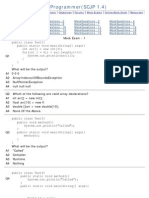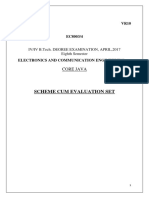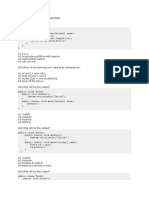🔹🔹 Guess the Output – Constructors in Java Q4
Q1 class Data {
class Message { int num;
Message() { Data(int n) {
System.out.println("Constructor called"); num = n;
} }
} }
public class Main { public class Main {
public static void main(String[] args) { public static void main(String[] args) {
Message obj = new Message(); Data d = new Data(100);
} System.out.println(d.num);
} }
------------------------------------------------ }
Q2 ------------------------------------------------
class NumberPrinter { Q5
NumberPrinter(int x) { class Greeting {
System.out.println("Value = " + x); Greeting() {
} System.out.println("Hello from constructor");
} }
public class Main { void show() {
public static void main(String[] args) { System.out.println("Show method");
NumberPrinter np = new NumberPrinter(10); }
} }
} public class Main {
------------------------------------------------ public static void main(String[] args) {
Q3 Greeting g = new Greeting();
class Display { g.show();
Display() { }
System.out.println("Default"); }
} ------------------------------------------------
Display(int x) { Q6
System.out.println("Parameterized: " + x); class MessagePrinter {
} MessagePrinter() {
} System.out.println("No-arg");
public class Main { }
public static void main(String[] args) { MessagePrinter(String msg) {
Display d1 = new Display(); System.out.println("Message: " + msg);
Display d2 = new Display(50); }
} }
} public class Main {
------------------------------------------------ public static void main(String[] args) {
MessagePrinter mp = new
MessagePrinter("Java");
}
}
------------------------------------------------
� Q7 Q10
class Logger { class Example {
Logger() { Example() {
System.out.println("Constructor"); System.out.println("Constructor 1");
} }
} Example(int x) {
public class Main { System.out.println("Constructor 2 with value " +
public static void main(String[] args) { x);
new Logger(); }
new Logger(); }
} public class Main {
} public static void main(String[] args) {
------------------------------------------------ Example e1 = new Example();
Q8 Example e2 = new Example(99);
class ObjectCreator { }
ObjectCreator() { }
System.out.println("Object created");
}
}
public class Main {
public static void main(String[] args) {
ObjectCreator o1 = new ObjectCreator();
ObjectCreator o2 = o1;
}
}
------------------------------------------------
Q9
class Calculator {
int val;
Calculator(int v) {
val = v;
}
}
public class Main {
public static void main(String[] args) {
Calculator c1 = new Calculator(10);
Calculator c2 = new Calculator(20);
System.out.println(c1.val + c2.val);
}
}
------------------------------------------------






















































































